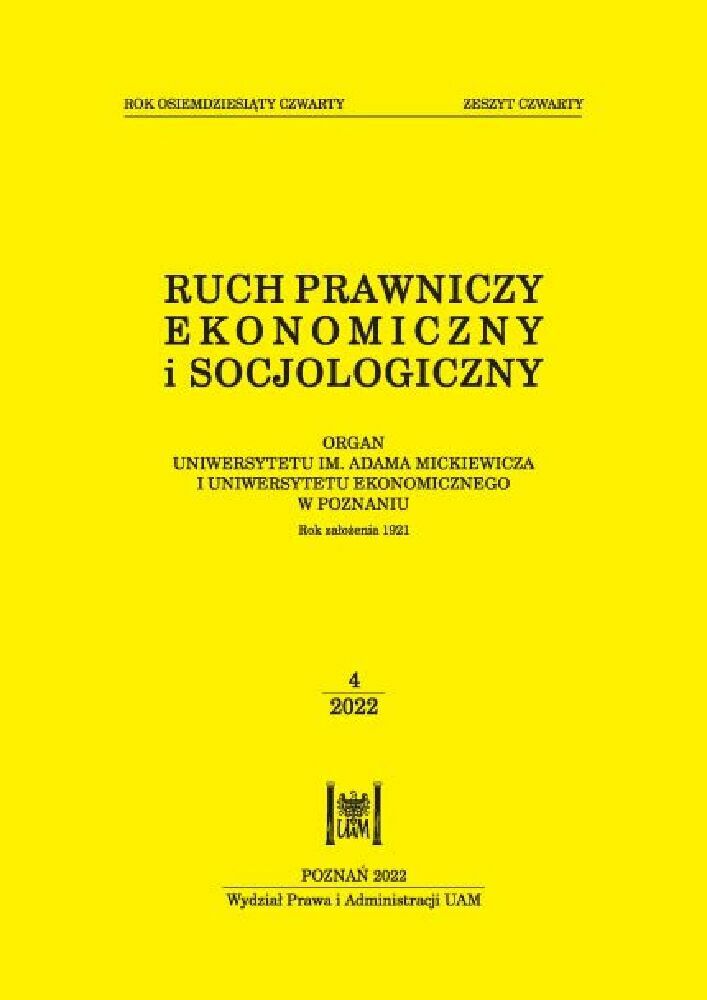Abstrakt
Niniejszy artykuł analizuje opinię publiczną w Polsce w odniesieniu do polityki i struktur państwa opiekuńczego. Rozpoczynamy od przedstawienia głównych badań nad modelami państwa opiekuńczego, w szczególności opierając się na typologii państwa opiekuńczego Espinga-Andersena. Następnie przedstawiamy istniejące sprzeczne badania dotyczące tego, czy w Europie Środkowo-Wschodniej (EŚW), w tym w Polsce, można zidentyfikować odrębny model państwa opiekuńczego. Wykorzystujemy to jako kontekst analizy opinii Polaków na temat państwa opiekuńczego. Nasze badania wykorzystują oryginalne dane ilościowe uzyskane z badania przeprowadzonego na reprezentatywnej próbie w Polsce. W polskim społeczeństwie istnieje szczególnie silne poparcie dla aspektów socjaldemokratycznego modelu państwa opiekuńczego. Co więcej, duża część polskiego społeczeństwa nadal popiera niektóre struktury opiekuńcze istniejące w czasach komu nizmu. Jednocześnie w najbardziej uprzywilejowanych grupach społecznych istnieje znaczne poparcie dla liberalnego modelu państwa opiekuńczego. Z analizy wynika zatem, że opinie polskiego społeczeństwa są mieszane, co do pewnego stopnia odzwierciedla hybrydowy charakter państwa opiekuńczego.
Bibliografia
Bonoli, G. (1997). Classifying welfare states: a two-dimension approach. Journal of Social Policy 26(3): 351-372. https://doi.org/10.1017/S0047279497005059 DOI: https://doi.org/10.1017/S0047279497005059
CBOS (2019). Elektoraty 2019 - charakterystyka poglądów. Komunikat z Badań 124.
Cerami, A. (2009). Mechanisms of institutional change in Central and Eastern European welfare state restructuring, [in:] A. Cerami, P. Vanhuysse (eds.), Post-Communist Welfare Pathways: Theorizing Social Policy Transformations in Central and Eastern Europe (35-52). Basingstoke: Palgrave Macmillian. https://doi.org/10.1057/9780230245808_3 DOI: https://doi.org/10.1057/9780230245808_3
Deacon, B. (2000). Eastern European welfare states: the impact of the politics of globalization. Journal of European Social Policy 10(5): 146-161. https://doi.org/10.1177/a012487 DOI: https://doi.org/10.1177/a012487
Diamond, P., Lodge, G. (2013). European Welfare States after the Crisis: Changing Public Attitudes. London: Policy Network Paper - Foundation for European and Progressive Studies. Esping-Andersen, G. (1985). The Three Worlds of Welfare Capitalism. Princeton: Princeton University Press.
Esping-Andersen, G. (1996). After the golden age - welfare state dilemmas in a global economy, [in:] G. Esping-Andersen (ed.), Welfare States in Transition: National Adaptations in Global Economies (66-87). London: SAGE Publications Ltd. https://doi.org/10.4135/9781446216941.n3 DOI: https://doi.org/10.4135/9781446216941.n3
Fenger, H.J.M. (2007). Welfare regimes in Central and Eastern Europe: incorporating post-communist countries in a welfare regime typology. Contemporary Issues and Ideas in Social Sciences 3(2): 1-30.
Ferge, Z. (2001). Welfare and 'ill-fare' systems in Central-Eastern Europe, [in:] R. Sykes, B. Palier, P. Prior (eds.), Globalization and European Welfare States: Challenges and Change (125-52). Basingstoke London: Palgrave. https://doi.org/10.1007/978-1-137-09783-5_7 DOI: https://doi.org/10.1007/978-1-137-09783-5_7
Ferrera, M. (1996). The 'Southern' model of welfare in social Europe. Journal of European Social Policy 6(1): 17-37. https://doi.org/10.1177/095892879600600102 DOI: https://doi.org/10.1177/095892879600600102
Golinowska, S. (2009). The national model of the welfare state in Poland: tradition and changes, [in:] S. Golinowska, P. Hengstenberg, M. Żukowski (eds.), Diversity and Commonality in European Social Policies: The Forging of a European Social Model (213-260). Warsaw: Fredrich Erbert Stiftung.
Inglot, T. (2003). Historical legacies, institutions and the politics of social policy in Hungary and Poland, 1989-1999, [in:] G. Ekiert, S. Hanson (eds.), Capitalism and Democracy in Central and Eastern Europe: Assessing the Legacy of the Communist Rule (210-247). New York: Cambridge University Press.
Jakobsen, T.G. (2011). Welfare attitudes and social expenditure: do regimes shape public opinion? Social Indicators Research 101: 323-340. https://doi.org/10.1007/s11205-010-9666-8 DOI: https://doi.org/10.1007/s11205-010-9666-8
Korpi, W., Palme, J. (1998). The paradox of redistribution and strategies of equality: welfare state institutions: inequality and poverty in the western countries. American Sociological Review 63(2): 661-687. https://doi.org/10.2307/2657333 DOI: https://doi.org/10.2307/2657333
Kuitto, K. (2016). Post-Communist Welfare States in European Context: Patterns of Welfare Policies in Central and Eastern Europe. Cheltenham: Edward Edgar. https://doi.org/10.4337/9781784711986 DOI: https://doi.org/10.4337/9781784711986
Lauzadyte-Tutliene, A., Balezentis, T., Goculenko, E. (2018). Welfare State in Central and Eastern Europe. Economics & Sociology 11(11): 100-123. https://doi.org/10.14254/2071-789X.2018/11-1/7 DOI: https://doi.org/10.14254/2071-789X.2018/11-1/7
Lendvai, N. (2009). Variety of post-Communist welfare: Europeanisation and emerging welfare regimes in the New EU Member States. Paper presented at the "Annual Meeting of the Research Committee 19 of the International Sociological Association", Montreal 2009, August 20-22.
Myant, M., Drahokoupil, J. (2015). Welfare and redistribution in post-Communist countries, [in:] C. Perugini, F. Pompei (eds.), Inequalities During and after Transition in Central and Eastern Europe: Studies in Economic Transition (284-305). London: Palgrave Macmillan. https://doi.org/10.1057/9781137460981_13 DOI: https://doi.org/10.1057/9781137460981_13
Piotrowska, K., Rae, G. (2018). Divergence not convergence: the strengthening of the post-Communist welfare state model in Central and Eastern Europe after European Union expansion. Polish Sociological Review 3(203): 303-319.
Rae, G. (2016). Public capital and the post-Communist welfare state: the case of Poland. Polish Sociological Review 194(2): 155-169.
Rae, G. (2017). The relationship between attitudes in Poland towards the decommodified welfare state with those on the Communist economy and transition to a market economy. International Journal of Social Economics 44(12): 2128-2140. https://doi.org/10.1108/IJSE-02-2016-0057 DOI: https://doi.org/10.1108/IJSE-02-2016-0057
Saint-Arnaud, S., Bernard, P. (2003). Convergence or resilience? A hierarchical cluster analysis of the welfare regimes in advanced countries. Current Sociology 51(5): 499-527. https://doi.org/10.1177/00113921030515004 DOI: https://doi.org/10.1177/00113921030515004
Wenzel, M., Zagórski, K. (2005). The choice of the Poles - American vs European social models, [in:] L. Kolarska-Bobińska, J. Kucharczyk, P. Kaczyński (eds.), Bridges across the Atlantic? Attitudes of Poles, Czechs and Slovaks towards the United States (57-86). Warsaw: Institute of Public Affairs.
Zagórski, K. (2018). Etatism versus liberalism: economic attitudes in Poland after the world crisis. Journal of Management and Business Administration. Central Europe 26(1): 149-170. https://doi.org/10.7206/jmba.ce.2450-7814.223 DOI: https://doi.org/10.7206/jmba.ce.2450-7814.223
Zagórski, K., Koźmiński, A.; Morawski, W., Piotrowska, K., Rae, G., Strumińska-Kutra, M. (2015). Postawy ekonomiczne w czasach niepewności. ekonomiczna wyobraźnia Polaków 2012-2014. Warsaw: Scholar.
Licencja
Prawa autorskie (c) 2022 WPiA UAM

Utwór dostępny jest na licencji Creative Commons Uznanie autorstwa – Użycie niekomercyjne – Bez utworów zależnych 4.0 Międzynarodowe.





